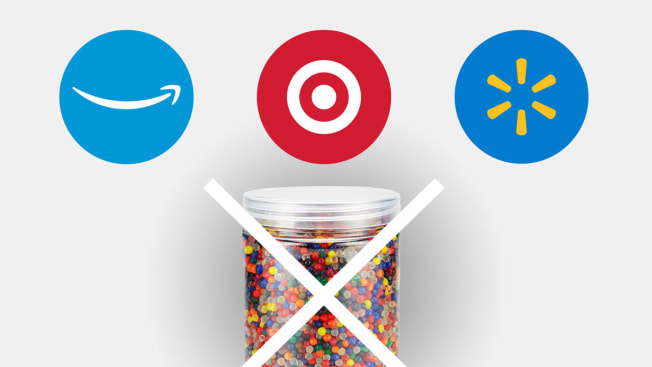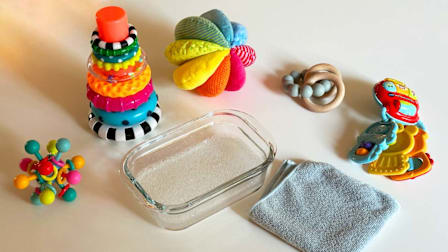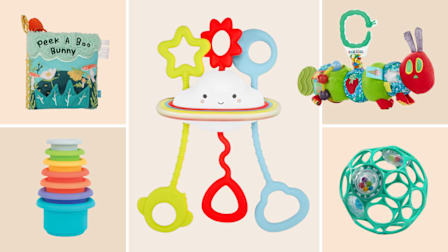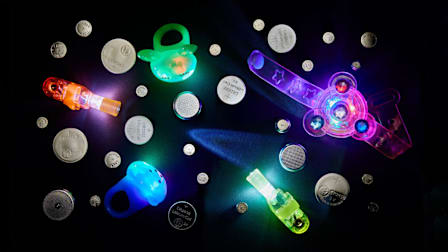Amazon, Target, and Walmart Announce They Will Stop Selling Water Beads Marketed for Children
The retailers, along with Michaels and others, acted after pressure from regulators, lawmakers, and parent advocates

Amid mounting pressure, Amazon, Walmart, and Target tell Consumer Reports that they have changed their policies on water beads: The companies will no longer allow the products to be sold if they are being marketed for children.
“In the interest of safety, Amazon will no longer allow the sale of water beads that are marketed to children, including as toys, art supplies, or for sensory play,” an Amazon spokesperson told CR. “We work hard to ensure the products offered in our store are safe, and we have teams dedicated to developing and updating our policies, evaluating listings, and continuously monitoring our store to prevent unsafe and noncompliant products from being listed.”
Amazon’s sellers will have to comply with the new policy by Dec. 22. The company says that the popular water bead brand Orbeez will now be prohibited and that water beads sold as ammunition for “gel blaster” guns will not be allowed if they are marketed for children.
Walmart tells CR it will prohibit the sale of all water bead toys and craft supplies that are marketed for children under age 9, both in stores and online.
Safe & Sound
Lily Glass, an Etsy spokesperson, told CR in early December that it will no longer allow water beads to be listed on its website for any reason. Previously, it had banned them when sold as toys but allowed them to be sold for other purposes. (In addition to children’s toys, water beads exist on the market as arts and crafts supplies, as vase fillers for florists, and as ammunition for “gel blaster” guns.)
The Alibaba Group, which owns the international retail site AliExpress, sent a letter to CR’s safety advocates in October, writing that the danger presented by water beads was “a critical matter” and that it would “take immediate action.” A news release about the new policy cited CR’s water beads investigation. Alibaba’s director of international government relations, Paul Nagle, told CR advocates that the company would take the extra step of contacting any customers who had bought them within 180 days of the policy change, to warn them of the risks.
Ebay told CR in early December that it has been prohibiting water beads from being sold as toys for the past several years, and requiring that nontoy listings include warnings that they are life-threatening if swallowed. This policy was established in response to “warnings from product safety regulators globally,” said Scott Overland, an eBay spokesperson.
In response to pressure from CPSC commissioner Richard Trumka in December, Jo-Ann, Kohl’s, Shein, and Hobby Lobby all committed to remove water beads from their shelves. Shein and Hobby Lobby are discontinuing those sold as toys, while Jo-Ann and Kohl’s said they are removing all water bead products altogether.
Other companies, though, have been less willing to change their policies in the absence of federal regulation in the U.S. For instance, Wish told CR that its sellers all adhere to local laws and that it would remove water beads from its site if the beads were banned by “relevant authorities.” Trumka did not receive a response from Wish.
The companies’ decisions about whether or not to remove these toys from their (physical or virtual) shelves are being made amid a drumbeat of revelations about how dangerous they can be to kids.
In September 2023, one water bead product was recalled after an infant died in July, and the CPSC published new warnings for parents and caregivers on its website. In October 2023, parents brought a class-action lawsuit against the makers of Orbeez, one popular water bead brand, alleging false advertising and fraudulent business practices. In November 2023, U.S. Rep. Frank Pallone Jr., D-N.J., announced a new bill in Congress that would ban water beads from being sold as toys. Pallone’s bill was co-sponsored by Rep. Robin Kelly, D-Ill., and Rep. Brittany Pettersen, D-Colo. Sen. Richard Blumenthal, D-Conn., has also written probing questions to the CPSC on this topic.
And in a recent development, an engineer at the CPSC wrote to a toy-safety-standard-setting group with the results of a test on water beads’ toxicity. According to his letter, some of the water beads contain acrylamide, a likely carcinogen and neurotoxin. CR’s own lab tests had also revealed that some brands contain BPA, challenging the validity of the “non-toxic” label so frequently seen on this type of toy.
Editor’s Note: This article, originally published Dec. 12, 2023, was updated later that month to include new information from Target and Michaels that was sent after publication, and updated again in January to include new information from the CPSC about additional retailers’ responses.




